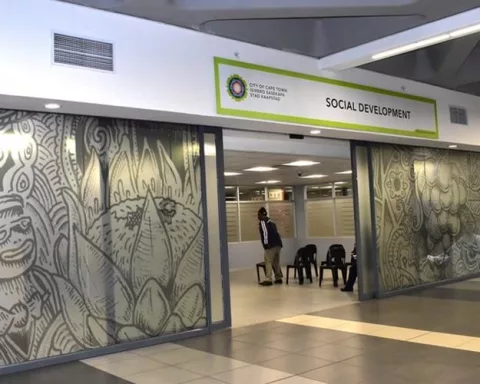The Castle of Good Hope in Cape Town is facing challenges from unlawful encampments and public safety issues, threatening the historical landmark’s reputation and the peace of the surrounding areas. To address these concerns, the Department of Public Works has initiated an eviction process and proposed transitional shelter solutions, emphasizing dignity, reintegration, and personal development opportunities. The city’s proactive approach against homelessness includes expanding and operating Safe Space transitional shelters and providing comprehensive services to aid individuals in transitioning from the streets. This all-embracing strategy offers hope for heritage monuments and cities grappling with similar challenges.
Preserving cultural heritage amidst social challenges is a pressing issue faced by many historical landmarks. The Castle of Good Hope in Cape Town is no exception, as it grapples with threats from unlawful encampments and public safety issues. To counter these urgent concerns, the Department of Public Works has initiated an eviction process and proposed transitional shelter solutions. The city’s all-embracing strategy emphasizes dignity, reintegration, and personal development opportunities, suggesting a future where heritage monuments can peacefully coexist with urban realities.
Unveiling the Dilemma
The Castle of Good Hope, an esteemed historical structure and Grade 1 National Monument, anchors itself as a cornerstone of Cape Town’s rich past. Unfortunately, this cherished symbol of heritage, which has long been a magnet for local and international tourists, presently grapples with threats from unlawful encampments. These issues not only tarnish the castle’s reputation but also challenge the peace of the nearby regions.
Nested in Cape Town’s bustling heart, the Castle of Good Hope narrates an age-old tale synonymous with the city’s vibrant history. The monument’s stone bricks reveal captivating narratives that draw numerous visitors. However, this iconic landmark has recently become the battleground for a skirmish with homelessness and public safety issues, which intensified during the national lockdown. These complications have jeopardized its status as a tourist attraction and disturbed the adjacent area’s tranquillity.
Implementing Solutions
In an attempt to counter these urgent concerns, the Department of Public Works (DPW) has initiated an eviction application. This move has received applause from Cape Town’s Mayor, Geordin Hill-Lewis, who stressed the necessity to reclaim the monument for public usage. Mayor Hill-Lewis highlighted the monument’s economic and tourism significance and the occupants’ welfare. He proposed that the most beneficial route towards dignity, health, and well-being for the occupants lies in accepting social assistance to make the transition from the streets.
The eviction process aligns with the broader support from the city, which has proposed transitional shelter at City Safe Spaces and NGO-run night shelters. These spaces offer more than just shelter; they present platforms for transformation, facilitating sustainable transitions from the streets and societal reintegration. These shelters aim to reconnect individuals with their families, provide personal development planning, job opportunities, and refer them for mental health, medical, and substance abuse treatment.
The city’s proactive stance against homelessness recently received a nod of approval from the Western Cape High Court. The court handed the City a final eviction order for several unlawful occupation sites in Cape Town’s Central Business District (CBD). The court lauded the city’s Safe Space shelters for providing dignified transitional shelter and applauded the city’s dedication to acknowledging the homeless’s humanity.
Beyond Eviction: A Holistic Approach
The city’s solution to the issue extends beyond eviction orders. Over the forthcoming three years, R220 million has been allocated towards expanding and operating Safe Space transitional shelters. The current capacity of 770 beds spread across the CBD, Bellville, and Durbanville facilities is set to see a substantial increase, with a 300-bed Safe Space shelter planned in Green Point.
The city’s Safe Space model embraces a comprehensive approach inclusive of comfort and ablutions, two meals a day, on-site social worker access, personal development planning, and a host of social services. These services encompass ID Book and social grant aid, family reunification, substance and alcohol abuse treatment, skills training, job assistance, and access to Expanded Public Works Programme work placement.
Additionally, the city bolstered the CBD’s Haven Night Shelter by 63% with a R500,000 cost contribution, expanding the facility from 96 to 156 beds. This venture, in conjunction with other supported programmes, has aided approximately 3,500 individuals with shelter placement or referrals to various social services in the year ending June 2023.
The Castle of Good Hope’s predicament underscores the intricate equilibrium between safeguarding cultural heritage and addressing pressing societal concerns. The city’s all-embracing strategy to tackle these challenges, emphasizing dignity, reintegration, and personal development opportunities, indicates an optimistic trajectory. This approach applies not only to the Castle of Good Hope but also to other historical landmarks wrestling with similar problems. The city’s steadfast commitment to reconciling public space with public welfare suggests a future where heritage monuments can peacefully coexist with urban realities. This offers a beacon of hope and inspiration for other cities grappling with similar challenges.
1. What is the Castle of Good Hope in Cape Town, and what challenges is it currently facing?
The Castle of Good Hope in Cape Town is a historical structure and Grade 1 National Monument that is facing threats from unlawful encampments and public safety issues, which tarnish the castle’s reputation and disturb the peace of the surrounding areas.
2. What is the Department of Public Works doing to address these concerns?
The Department of Public Works has initiated an eviction process and proposed transitional shelter solutions that emphasize dignity, reintegration, and personal development opportunities for the occupants.
3. How does the city of Cape Town plan to support individuals transitioning from the streets?
The city of Cape Town is expanding and operating Safe Space transitional shelters and providing comprehensive services, including personal development planning, job opportunities, and referral for mental health, medical, and substance abuse treatment, to aid individuals in transitioning from the streets.
4. What is the city’s Safe Space model, and what services does it offer?
The city’s Safe Space model includes comprehensive services such as comfort and ablutions, two meals a day, on-site social worker access, personal development planning, and access to social services such as ID Book and social grant aid, family reunification, substance and alcohol abuse treatment, skills training, job assistance, and access to Expanded Public Works Programme work placement.
5. What is the city doing beyond eviction to address homelessness?
The city has allocated R220 million towards expanding and operating Safe Space transitional shelters, with plans to increase capacity substantially and open a new 300-bed shelter in Green Point. The city has also contributed R500,000 to expand the CBD’s Haven Night Shelter and supports other programmes that aid individuals with shelter placement or referrals to social services.
6. What does the Castle of Good Hope’s predicament teach us about preserving cultural heritage amidst social challenges?
The Castle of Good Hope’s predicament highlights the need to balance safeguarding cultural heritage with addressing pressing societal concerns. The city’s all-embracing strategy, emphasizing dignity, reintegration, and personal development opportunities, suggests an optimistic trajectory and offers hope and inspiration for other cities grappling with similar challenges.












